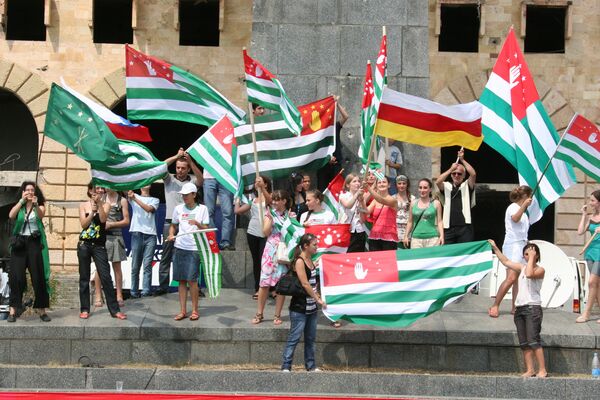By an odd coincidence, February 17 has linked two unrecognized (or semi-recognized) non-identical twins - Kosovo and Abkhazia. Two years ago, on February 17 Albanians unilaterally proclaimed the independence of the territory that Serbia considers its own and calls "Kosovo and Metohija." On February 17, 1810, that is, 200 years ago, the Abkhazian principality joined the Russian Empire of its own free will.
Its incorporation into Russia has several interpretations among the highly volatile Russian scholars. Some historians maintain that it was the ruling dynasty that joined Russia, after which almost half of Abkhazians left the country. However, voluntary accession is a viable version since the other half stayed.
In any event, Abkhazian President Sergei Bagapsh, who is currently in Moscow on an official visit (February 16-18) and his host President Dmitry Medvedev, have something to celebrate. Thus, in honor of the memorable date, Abkhazia offered Russia to run its railroad and Russia agreed.
For Kosovo the anniversary is marred by the legal proceedings in the International Court of Justice in The Hague regarding its declaration of independence. Since the past year the court has been debating this issue at Serbia's request (in the UN it was supported by 77 countries, with 74 abstaining and six voting against it). The verdict will be passed in late spring or summer.
Importantly, the verdict will be merely consultative but not legally binding. However, even these proceedings are enough to keep tensions between three camps - Kosovo's supporters, opponents, and all other non-identical twins - Abkhazian, Kosovar and Ossetian proto-statehood.
The verdict may have the following consequences. If the court decades that Kosovars had a legal right to their declaration of independence (which is not likely), dozens of movements, groups and territories will be inspired to step up their struggle for independence and recognition. If the court rules that they did not have that right (which is also unlikely), the Kosovo issue will be in limbo again. But in this case dozens of movements, groups and territories will also be inspired to intensify their struggle for independence and recognition but for a different reason: "If the UN is so unfair, then..."
There are also more global problems linked with the entire system of UN functioning. Law experts fear that if The Hague recognizes the legality of Kosovo's independence, the UN ability to conduct peacekeeping missions will be endangered. Unstable states with separatist attitudes may refuse to accept the UN peacemaking mission because Kosovo created a very bad precedent: First UN troops enter a territory and then this territory proclaims its independence.
Judges in The Hague Court will have a hard time. They are going into such wilds of jurisprudence from which only very educated people can emerge unscathed. But they can make a compromise decision, for example that the Albanians had the right to proclaim independence but they didn't approach the issue correctly, and the Serbians are right about some things but wrong about others, etc. In law, conformism is more often called "broad interpretation." This is what the court is most likely to do. It has an unlimited range of instruments for this purpose.
International law has two main theories on recognizing statehood - declarative and constituent. Both are equally applicable to Kosovo, Abkhazia, Ossetia, etc. In general this law is tailored in such a way that skillful lawyers can pull it in any direction and make any issue almost fully transparent or totally ambiguous. Debates in the UN bear out that this applies to resolutions on Kosovo.
The advocates of "declarative statehood" are convinced that for its recognition it is necessary to have a fixed territory, a permanent population, a government and an ability to enter relations with other states. Supporters of "constituent statehood" believe that to achieve independence it is enough to be recognized by other states, or even by one state. President Medvedev quoted this theory in regard to Abkhazia and South Ossetia, although this does not at all mean that he supports it. This is just an example.
International law is not a hadron collider or open heart surgery. The precision of hadron particles or sharp scalpels can only harm rather than be helpful there. As it often happens in international law, it is possible to choose the most befitting instrument for the specific geopolitical, historic, diplomatic, military, economic and disputed territorial conditions. This is what interpretation of an ambiguous decision is all about.
The trouble is that non-identical twins like Kosovo or Abkhazia can also interpret the decisions of The Hague Court the way they see fit, and there are many more of them than it may seem at first sight.
Unrecognized states (or recognized by many or several countries, or by one state) include Kosovo (recognized by 65 out of 192 UN members), Abkhazia and South Ossetia (recognized by Russia, Nicaragua, Venezuela and Nauru). There are also other states like Taiwan, Nagorno-Karabakh, Somaliland, Transdnestr, the Turkish Republic of Northern Cyprus, Armenia (unrecognized by Pakistan), the Palestinian Autonomy, Israel (unrecognized by 20 Muslim countries), South Korea (unrecognized by North Korea) and North Korea (unrecognized by South Korea), the Sahrawi Arab Democratic Republic (West Sahara), the Czech Republic and Slovakia (still unrecognized by Lichtenstein, and the other way round) because of a territorial dispute.
The number of separatist or autonomy movements in the world is countless. Most of them are based in Europe: 25 big, medium and small ones from Albania to Germany, Belgium, Spain and Portugal. Africa is the runner-up with 24 groups, and Asia is third with 20. There are 21 such movements in North, Central and South America. There are separatist groups even in the U.S. Caribbean islands, which would like to break away from the metropolis. All of them are watching The Hague Court.
The opinions expressed in this article are the author's and do not necessarily represent those of RIA Novosti.
MOSCOW. (RIA Novosti political commentator Andrei Fedyashin)

